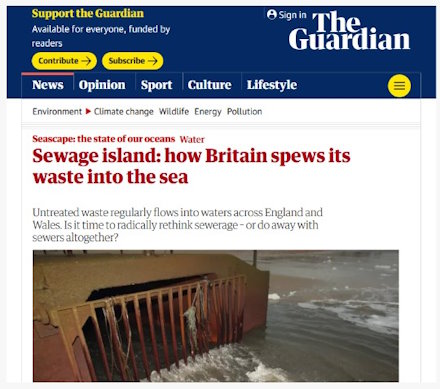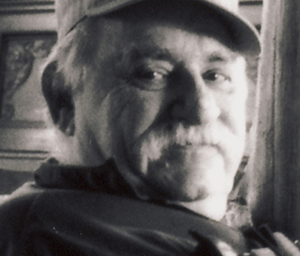Save the planet for ever
by Nick Wiseman
We are living in uncertain times. Global warming continues at an alarming pace. Russia’s yearning for a lost empire threatens a new cold war or worse. Social media bubbles reinforce prejudice and reduce intelligent debate. In the UK, democracy has become fragile and political decisions are often incomprehensible. Few would object if frontline NHS staff received a generous pay rise yet the government refuses (so far) to make the obvious decision. The determination of refugees to reach the UK by any means possible has led to ever harsher restrictions despite the gap in the workforce caused by Brexit. Water companies are, with impunity, allowed to pour raw sewage into rivers and coastal waters.
The old adage that the rich get richer and the poor get poorer has never been truer. We do not seem able to create a fairer, more caring society. There is no clear plan to redress inequality, let alone solve the climate crisis or eliminate global conflict. Or is there?
Yes, actually there is. It’s called social ecology and it formulates a way that society can become fairer, more just and far more protective of the environment, without limiting basic freedoms. Originally conceived by Murray Bookchin (1901-2006), a political activist who became disillusioned with Stalinism and the hard left and went on to study anthropology, ancient Greek democracy and anarchist theory in search of an answer to the world’s ills, social ecology requires a revolution in the way we organise political decision-making to achieve its utopian goals.
According to social ecologists, humankind has come to accept inequality and hierarchy – centralised decision-making; domination by a few over the many in all social spheres – in the belief that it is an unavoidable result of civilisation and human development. Yet, as David Graeber and David Wengrow argue in The Dawn of Everything, humans did not have to evolve in this way. Early societies were far more fluid in terms of social structure; men did not dominate women; as hunter-gatherers became settled farmers it did not automatically result in entrenched power structures. Social ecologists believe that a kind of Darwinian evolution of society must take place, and rapidly, if we are to survive as a species. The political structures and social mores that have developed – think nation states; economic growth as the main indicator of success; pressure to work hard and spend remorselessly – are not fit for purpose.
Murray Bookchin started writing about man’s destruction of the planet at the start of the 60s, long before the emergence of the Green party and Extinction Rebellion. He observed the way societies had developed into hierarchical structures, in which men dominated women and kings and landowners dominated subjects and serfs. This ran contrary to the fluid relationships that existed in prehistoric societies with mutual support networks and no domination of men over women, despite gender roles relating to child rearing, finding and preparing food. Relating this to the natural environment, where the hardiest and most durable ecosystems have the greatest diversity, he concluded the way we organise politically and socially needs to adapt to preserve the planet and restore individual freedoms.
In the 40 years from Bookchin’s first writing on the subject till his death, his ideas developed into a complete political philosophy. Meanwhile, the problems caused by domination and hierarchy worsened. The Soviet Union eventually imploded, to be replaced by an imperialistic Russia and autocratic regimes in many of its former satellites. In the West, capitalism reached its nadir following Milton Friedman’s writing an essay in 1970 entitled “The Social Responsibility of Business is to Increase its Profits”. Within 10 years, Friedman’s teachings became the accepted wisdom for corporations throughout the west, and fundamental to the economic policies of the Reagan and Thatcher governments. Protecting the environment didn’t get a look-in.
Since then, things have improved somewhat. Governments legislate to reduce carbon emissions, and companies have developed ESG (environmental, social and governance) policies in recognition that Friedman was wrong. But it is not enough. According to social ecologists, this is just tinkering with the problem and the only way to address the consequences of excess consumption, greedy capitalism (Amazon and Starbucks, for example) and gross inequality is for everyone to participate in the decision-making processes that affect our lives and the lives of those around us.
Environmental movements and prominent campaigners like Greta Thunberg encourage us to behave more responsibly– recycle; fly less; use public transport. But the relentless push to consume doesn’t cease. At its root is the capitalist ethos. According to Bookchin, capitalism is inherently anti-ecological. The advertising industry, inextricably linked to capitalism, expends enormous energy exhorting us to purchase things we don’t actually need. We live in a world where basic medications, cereal crop seeds and even human DNA sequences are patented and exploited for profit by private corporations, despite their obvious benefit to all mankind.
A fundamental change is needed and this requires a revolution, a reworking of the existing political structures. Social ecologists propose that they are replaced with hyperlocal confederated assemblies where everyone can participate. These elect representatives to assemblies at the town, regional and national level. Political decisions happen at the lowest possible level. The tendency of men to dominate women is redressed by requiring that at least half the members of elected assemblies are women, as well as half the official posts. Bookchin coined the term communalism to describe such a political organisation.
Social ecologists believe that the resulting participation of people in decisions that affect their lives would raise consciousness to the extent that we become more caring and willing to help each other, less greedy and less inclined to make choices that cause damage to the environment. It sounds like an incredible, unrealisable dream. Indeed, social ecologists study writings on utopian worlds, from Plato’s Republic to Sir Thomas More (who coined the term utopia) and Saint-Simon. In short, social ecology proposes ethical principles for replacing a society’s propensity for hierarchy and domination with democracy and freedom.
Despite appearing to be unachievable, there is, remarkably, one place in the world that has adopted Bookchin’s teachings lock, stock and barrel. Here, we find local community groups that represent a diverse ethnic population; men and women living as equals despite being in a part of the world where male domination is everywhere; decisions made with active participation of those affected. This is Rojava, more formally known as the Autonomous Administration of North and East Syria (AANES). All political decisions are made by committees organised at multiple levels – communes, districts, areas and cantons. Every position at each level of government in the region includes a “female equivalent of equal authority” to a male.
It would be wonderful to be able to write that AANES is a Shangri-La but it isn’t. Its existence is precarious in the extreme. Allowed to survive within the borders of Syria by a weak Assad-led regime, it could at any time have its autonomy removed. Turkey, taking objection to the close ties between the Kurdish PKK movement which it regards as terrorists and AANES, has occupied a strip along its border and allowed it to be run by a criminal gang of ex-Isis fundamentalists. Within AANES lies the notorious Al-Hawl refugee camp whose most famous resident is Shamima Begum. The region is majority Kurdish, with substantial Arab and Turkmen minorities. These groups have experienced enormous interethnic conflict in recent times and continue to do so in the areas surrounding AANES. Nevertheless, maintaining fair representation of the different ethnicities in the political structures has largely succeeded, with the various groups sometimes expressing surprise at their ability to reach consensus.
There is, tragically, no clear blueprint for creating a society based on social ecology principles, though things are slowly moving in the right direction. People are becoming more involved and active on specific issues, forming groups working for environmental or social justice goals, and campaigning to stop massive developments and exploitation of natural resources. One notable example is the way in which local residents organised opposition to build four concentric ring roads in and around London in the 1970s, and managed to bring about change at local authority and city (GLC) level. Only one of the ring roads went ahead – the M25. The only section of the innermost ring road that was built is Westway, which is a flyover made famous by The Clash that joins west London with the Marylebone Road.
These grassroots organisations signpost the way forward, especially if they can coalesce into more formal and durable democratic groups that influence, and ultimately change, political structures at local, regional and national level. Making our voice heard on local and national issues is important; participating in or, better, organising campaign groups often brings results. Direct action can and does work. Challenge assumptions around economic growth and the need to work full-time. Vive la révolution sociale!
Further reading:
Institute for Social Ecology (social-ecology.org) – try one of their courses for a deeper dive
How to change the course of human history (eurozine.com/change-course-human-history) – David Graeber and David Wengrow write about how our history has been misunderstood
The Ecology of Freedom: The Emergence and Dissolution of Hierarchy by Murray Bookchin (or anything else by him)
Ecology or Catastrophe: The Life of Murray Bookchin by Janet Biehl – a biography of this remarkable and under-appreciated person